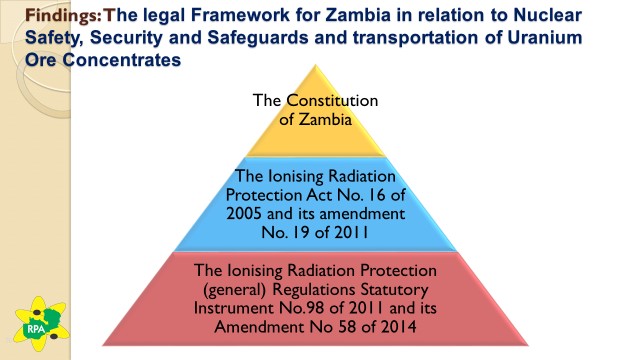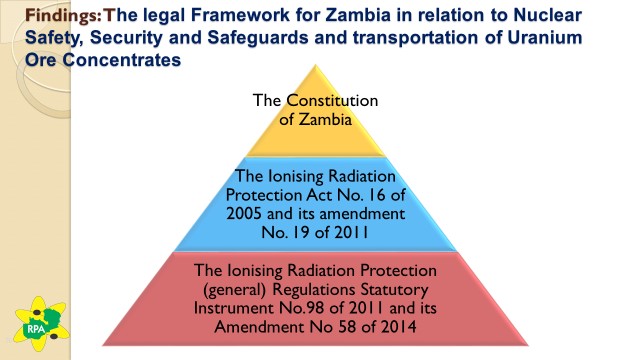SADC Project helps Zambia’s nuclear regulator engage stakeholders in radiation safety


On 23 and 24 June 2021 the Radiation Protection Authority (RPA) of Zambia organized workshops with relevant national stakeholders to register their opinion on draft normative documents design to improve the governance of the nuclear sector and in particular to increase the level of safety during transportation of UOC and radioactive materials. The subject matter on the discussion was the national country specific report on the state of affairs, elaborated by RPA experts under the EU Project MC 5.01 15B Support to Southern African Stated in Nuclear Safety and Safeguards.
Through this EU funded project, the ISTC supports capacity building activities for safe uranium mining and transport, and facilitates the exchanges with and within sub-Saharan Africa. ISTC assists the 16 member states of the Southern African Development Community (SADC) to increase their levels of nuclear safety and security. Authors of the eight country-specific reports on uranium transport matters presented their findings at a series of ISTC monthly webinars. On 21 April 2021 during the third webinar. Ms Melody Mwewa, Manager, Nuclear and Radiation Safety Department, RPA, presented the Country Specific Report- the Legal Framework for Zambia in relation to Nuclear Safety, Security and Safeguards and transportation of Uranium Ore Concentrates. The report received appreciation and various recommendations.
As a follow up, on 23 June, RPA organized a workshop with stakeholders from industry on the Roadmap for strengthening Zambia’s regulatory and legal framework on uranium exploration, mining and transportation of uranium ore concentrate and other radioactive materials. The following companies and other entities took part in the discussion: Kalumbila Minerals Ltd.; Mopani Copper Mine-Nkana; Kansanshi Mine Pie; Lumwana Mine Company; Mineral Resources Ltd.-Konkola; GoviEx Uranium Zambia; Misenge Environmental and Technical Services; Chambishi Metals Pie; Ministry of Higher Education; Mining Cadaster Department; Mining Safety Department; and, Geological Survey Department.
The RPA Acting Executive Director Mushaukwa Kabuku recalled that according to the National Nuclear Policy of 2020, the mining of uranium is envisaged to accord the country the much-needed foreign exchange and if the country attained the milling and fabrication technologies it could make its own fuel for the planned Nuclear Power Plant. However, the Ionizing Radiation Protection Act and the Regulations do not effectively address the regulation of uranium activities. License holders- operators, shippers and carriers - are assigned the primary responsibility for implementing, maintaining and testing security measures. The businesses are invited to form the Technical Working Group, designed to spearhead the implementation of the action plan on legislative update.
Equally important were the consultations on 24 June with competent government agencies: Civil Aviation Authority; Disaster Management and Mitigation Unit; Ministry of Transport and Communication; Road Transport and Safety Agency; Nuclear Program Implementing Unit; and ministries of defense, foreign and home affairs. The establishment of an effective a National Nuclear Security Regime was scrutinized with the objective of protecting persons, property, society, and the environment from harmful consequences of a nuclear security event.

